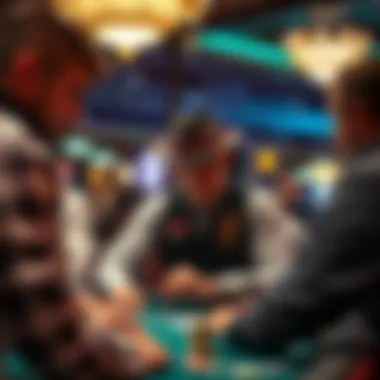Exploring WSOP Poker Dealer Careers and Challenges


Intro
In the electrifying universe of the World Series of Poker (WSOP), poker dealers occupy a crucial, yet often underappreciated, role. This article aims to cast a spotlight on the intricate world of WSOP poker dealer jobs. Dealers serve not just as facilitators of the game, but as vital cogs in the machinery of a high-stakes tournament where fortunes can change in an instant. In this exploration, we will break down the skills required, hiring processes, and the unique challenges faced in such a thrilling environment.
Whether you're a gambling aficionado or someone merely curious about what it takes to become a dealer at the WSOP, there’s a wealth of information awaiting. From the nuts and bolts of effective game strategies to industry trends shaping the future of poker, this article aims to provide a comprehensive guide to the career of a poker dealer.
Get ready to delve deep into how dealers ensure that every hand is played fairly, how they contribute to the vibrant atmosphere of the tournament, and what aspiring dealers should know before stepping onto the grand stage of the WSOP. The road to becoming a poker dealer is laden with challenges, yet filled with rewarding experiences that often come only to those who dare to take the plunge.”
Understanding the Role of a Poker Dealer
The role of a poker dealer at the World Series of Poker (WSOP) is pivotal in shaping the overall experience of the game. When you picture a bustling table laden with chips and eager players, the dealer stands as the linchpin, orchestrating the game's flow. This job is multifaceted—it requires a balance of technical skills, impeccable timing, and the ability to navigate high-pressure situations with poise.
A dealer does not simply shuffle and deal cards; rather, they are the guardians of the game's integrity. They ensure that the rules are followed, that every player adheres to the protocol, and that the atmosphere remains electric yet fair. For anyone considering a career as a poker dealer, understanding this role's depth is crucial, as it blends a series of responsibilities that go beyond just handling cards.
Defining a Poker Dealer's Responsibilities
Poker dealers bear a host of responsibilities that contribute not only to the game's excitement but also to its fairness:
- Managing Card Distribution: A dealer must confidently perform the shuffling and dealing of cards. This task may seem simple, yet it requires precision to avoid any mistakes that can lead to disputes among players.
- Authority on Rules: Dealers must have a comprehensive understanding of poker rules—not just the general ones but also those that might differ depending on the variant being played. For instance, Texas Hold’em has specific rules about betting rounds and the community cards that differ greatly from Omaha.
- Facilitating the Game: Timing is everything in poker, and dealers help keep the game progressing smoothly. They manage the betting, control the pace of the game, and may also be responsible for announcing actions taken by players, such as folding or raising.
- Handling Chips: They also manage the chips, ensuring players have the correct amount and counting chips during cash outs or payouts accurately. This part is crucial as it involves significant financial responsibility and requires attention to detail.
- Conflict Resolution: When the tension rises, a dealer needs to have a steady hand. They often serve as mediators in disputes, making immediate decisions about gameplay issues and ensuring player satisfaction without compromising the game's fairness.
In essence, the role of a poker dealer intertwines various intricate aspects, painting a picture of a professional deeply involved in the game and its participants.
The Importance of Dealers in Poker Games
The significance of poker dealers extends beyond dealing cards. Dealers act as the heartbeat of poker tables, creating a dynamic environment that can often sway the outcomes of tournaments and games. Their presence brings structure and organization that players rely on.
- Maintaining Fairness: A competent dealer ensures all players have the same experience, adhering to the rules regardless of any player's stake or status. This impartiality is what allows the game to be trusted.
- Enhancing the Experience: For many players, especially novices, a dealer can provide valuable insights and guidance. They help newcomers learn the ropes, making the game more approachable and enjoyable.
- Creating Atmosphere: Dealers can influence the mood at the table. Their demeanor and engagement level can affect how players interact, often leading to friendly banter or intense focus. The ambiance at the WSOP, with its electric energy, is often thanks to the dealers who help foster that environment.
In summary, poker dealers fulfill essential roles that contribute to not just the mechanics but the culture of poker itself. They embody professionalism and expertise that keep the game thriving, making their role indispensable in tournaments like the WSOP.
Skills Required for WSOP Poker Dealers
To thrive in the competitive atmosphere of the World Series of Poker, acquiring a set of specialized skills as a dealer is non-negotiable. It's not just about handling cards; it’s about crafting an experience for players and ensuring the game runs smoothly and fairly. In this section, we will peel back the layers of what makes a successful poker dealer, focusing on the technical, interpersonal, and personal attributes that stand out.
Technical Skills in Card Dealing
The ability to handle cards efficiently is the cornerstone of a dealer's role. This involves a mastery of shuffling, dealing, and managing chips with flair and precision. The mechanics of dealing require understanding the nuances of the game variants – whether it's Texas Hold'em or Omaha, each has its own rhythm and flow.
Some of the technical proficiencies include:
- Speed and Accuracy: A dealer must deal cards swiftly to maintain the pace of the game, ensuring that players aren't left waiting.
- Knowledge of Game Rules: Each type of poker game comes with its own set of rules. It's crucial for dealers to have these rules at their fingertips, ready to enforce them without hesitation.
- Chip Management: Knowing how to stack and distribute chips accurately can mean the difference between a smooth operation and chaos at the table.
Dealing successfully demands not just skill but also a keen eye for detail. One slip can not only confuse players but also cause delays that dampen the excitement of the game.
Interpersonal Skills for Effective Communication
In the bustling arena of poker, interpersonal skills can make or break a dealer’s day. The ability to communicate clearly with players, casino staff, and supervisors is paramount. A poker dealer isn’t just a passive participant; they are at the heart of the table’s atmosphere.
Key interpersonal skills include:
- Clear Communication: Dealers must articulate rules and decisions in a way that's easily understood. Miscommunication can lead to heated disputes.
- Customer Service Orientation: Showing enthusiasm, even in the high-pressure environment of a tournament, can enhance player experience and satisfaction, fostering a welcoming atmosphere.
- Conflict Resolution Skills: Disagreements between players can arise, and a good dealer should possess the ability to diffuse tensions and mediate disputes diplomatically.
A strong rapport with players can lead to a better atmosphere at the table. Establishing a connection, even if brief, can enhance player retention and enjoyment.
The Role of Patience and Composure
Dealing poker is often a juggling act, requiring the dealer to handle several tasks at once while maintaining grace under pressure. Patience and composure are invaluable attributes in navigating the whirlwind of a bustling poker tournament.


- Dealing with Pressure: Fast-paced environments can lead to anxiety. Dealers must remain calm, ensuring they do not become flustered when things get hectic. Players notice when dealers are composed, making for a smoother game.
- Maintaining Focus: The attentiveness needed in multitasking while keeping an eye on player behavior and reactions cannot be overstated. A single distraction can have cascading effects on the flow of the game.
- Endurance: Long shifts may stretch into hours of non-stop dealing, and staying focused and patient helps prevent mistakes, allowing the dealer to maintain professionalism throughout their workday.
By fortifying a strong foundation in these skills, one can find not only success but also fulfillment in a career as a poker dealer, particularly in an environment as esteemed as the WSOP. Whether you're in it for the thrill or as a stepping stone to further opportunities within the casino, these skills are not just beneficial; they are essential for anyone looking to break into the world of professional poker dealing.
The Hiring Process for Poker Dealers
The process of hiring poker dealers is crucial, particularly within the prestigious World Series of Poker (WSOP) environment. The way dealers are selected can significantly impact not only the game's integrity but also the overall experience of the players involved. This section sheds light on what goes into selecting qualified individuals for such a high-stakes role, underscoring the importance of a structured hiring process.
Application and Interview Procedures
To begin with, the application process for poker dealers can be quite competitive. Most casinos and tournament organizers, like those for the WSOP, typically require applicants to submit a detailed resume highlighting their experiences.
When preparing your CV, focus on relevant skills, including any prior experience in customer service or in similar roles, which can often catch the eye of hiring managers. A well-crafted cover letter isn’t a bad idea either; it offers a chance to express your enthusiasm for the role and to show that you understand the demands of the job.
Once your application passes the initial screening, you may find yourself invited for an interview. During this phase, expect a mix of technical questions on card dealing techniques as well as situational inquiries. These may pertain to things like how to handle a particularly challenging player or how to stay calm under pressure.
Moreover, some establishments might even set up a practical test that involves dealing cards in a simulated environment, assessing your speed, accuracy and overall demeanor during gameplay.
Training and Certification Requirements
Once individuals are selected, the next step involves rigorous training to ensure they are fully prepared for the task at hand. This training usually covers a variety of essential topics, including the rules of several poker variants, chip handling practices, and the proper dealing techniques. Familiarity with the WSOP-specific regulations is crucial, as these can differ from standard casino games.
Training is often followed by a certification process, which could be mandatory or at the discretion of the casino. Such certifications serve to validate your skills, giving you an edge over other applicants in the future.
"A well-trained dealer can elevate the player experience, ensuring the game flows smoothly and fairly—truly the unsung hero of any poker table."
In summary, becoming a dealer at WSOP involves more than just mastering the art of card handling. It’s about going through a meticulous hiring process that includes applications, interviews, and training courses that prepare you for an exciting yet demanding environment. Understanding these steps will not only better position you as a candidate but also enhance your appreciation of what it takes to function within the dynamic world of poker tournaments.
Compensation Structure for Poker Dealers
Understanding the compensation structure for poker dealers is essential for anyone eyeing a career in this field. It’s not merely about the paycheck at the end of the month; rather, it’s a combination of base salaries and tips, along with various considerations that can significantly influence a dealer's earnings.
Understanding Base Salary versus Tips
When discussing the compensation of poker dealers, one cannot overlook the distinction between base salary and tips. Dealers typically earn a base salary, which can range greatly based on factors such as experience, location, and the specific casino brand. For instance, a beginner dealer at a local card room might see a monthly salary of around $2,000, while experienced dealers at prominent venues like the Bellagio in Las Vegas may earn much more.
However, it’s the tips that really spice things up. Tips can account for a large chunk of a dealer's earnings. Some dealers report that tips add anywhere from 30% to over 50% to their income. During busy tournament seasons like the World Series of Poker, tips can soar given the high-stakes environment and the generosity of professional players looking to enhance their gaming experience.
Moreover, the way tips are shared can vary from one establishment to another. Some casinos operate on a "toke box" system, where all tips are collected and then evenly distributed among dealers. Others allow individual tipping, where a dealer keeps whatever they receive directly from players. This can create a competitive atmosphere where service and personality play critical roles in a dealer's success.
Factors Influencing Earnings
Several elements come into play when assessing a poker dealer's potential earnings. Factors influencing their compensation can include, but are not limited to:
- Experience Level: More experience generally correlates to higher pay. Veteran dealers often command a premium in salary and tips, mainly as they possess refined skills and efficiency.
- Location: The geographical location also plays a significant part. Dealers at high-profile casinos in bustling cities like Las Vegas or Atlantic City typically earn more than their counterparts in smaller towns or rural areas.
- Game Type: Different game types can result in different earnings. For instance, working at a Texas Hold'em table at a major tournament could yield more tips than dealing a low-stakes game.
- Shift Timing: Evening or weekend shifts tend to be busier, leading to higher earnings from both salary adjustments and tips due to increased player traffic.
"In the high-stakes environment of poker dealing, excellent customer service is not just a nice-to-have; it’s a vital contributor to earnings."
For a deeper insight into what influences earnings in the casino industry, consider checking resources such as Casino.org or GamblingSites.com for updated articles and statistics.
Challenges Faced by Poker Dealers
Working as a poker dealer, particularly in high-stakes settings such as the World Series of Poker (WSOP), is no walk in the park. Beyond just shuffling cards and managing chips, dealers encounter a variety of challenges that can put both their skills and their patience to the test. In this section, we will explore the hurdles poker dealers face on a daily basis, shedding light on how these experiences shape their roles in such a fast-paced environment.
Dealing with Stressful Situations
Stress is an undeniable component of working as a poker dealer. During tournaments, the stakes can rise dramatically, and the pressure can be overwhelming. Imagine a scenario where a large sum of money is at play, and tensions among players are running high. The dealer must maintain composure, ensuring that each game runs smoothly, all while being the focal point of the room's energy.


Key challenges include:
- Maintaining Focus:
- Time Management:
- Handling Stakes:
- Keeping a sharp mind is critical, especially when the game is in full swing. A dealer must remember rules, manage payouts, and be alert to any discrepancies that may arise.
- There’s often a ticking clock in tournament settings, pressuring dealers to deal cards swiftly without compromising accuracy.
- High-stakes games may escalate emotional reactions, requiring dealers to stay level-headed and professional.
"A poker dealer's work is like walking a tightrope; one misstep can lead to chaos in the game".
In these moments, experience and sharp instincts become invaluable. For instance, many dealers learn to recognize the early signs of player disputes or potential altercations, allowing them to diffuse tension before it spirals out of control.
Navigating Player Conflicts
Conflict is part of the nature of competitive games. Being the intermediary between players sometimes means being caught in the crossfire of disagreements. Dealers must navigate these conflicts with a diplomatic touch, effectively managing different personalities while adhering to the rules of the game.
Common types of player conflicts include:
- Misunderstandings:
- Accusations of Cheating:
- Disputes Over Money:
- Players may misinterpret rules or dealers' actions. Clear and calm communication is essential in these scenarios.
- These situations can escalate quickly. Dealers must handle accusations firmly but fairly to maintain a pleasant gaming atmosphere.
- Whether issues arise around the handling of chips or payouts, it's crucial for dealers to have an in-depth understanding of the house rules to settle disputes fairly.
Navigating these conflicts requires not just knowledge of the game but also emotional intelligence and the ability to mediate disputes. By being attentive and employing strategies to resolve issues calmly, dealers can mitigate the potential for confrontation, making the environment more enjoyable for everyone.
Managing stress and conflicts effectively is not merely about skill; it speaks volumes about a dealer's character and professionalism. They are, in essence, the unsung heroes of the poker table, ensuring fairness prevails while tempers can flare. As we delve further into the intricacies of the poker dealer role in subsequent sections, it becomes clear that these challenges are not just obstacles; they are also what molds a proficient dealer into an indispensable part of the poker experience.
Career Advancement Opportunities
Understanding career advancement for poker dealers is significant in this article as it opens the door to not just better compensation, but also deeper engagement in the fast-paced environment of poker. Investing time and effort into climbing the career ladder can certainly pay off, whether you have your sights set on supervisory roles or wish to transition into entirely different casino positions. It can shape your career and provide substantial growth in both responsibility and influence within the poker world.
Pathways to Supervisory Roles
Achieving a supervisory role as a WSOP poker dealer often begins with mastering the basics of dealing. The journey generally starts with an entry-level position, where you gain valuable experience and insight into the daily operations of a poker room. Once you have a solid grounding, it’s crucial to show initiative and a keen understanding of the game dynamics. Here are some pathways that may lead you to supervisory positions:
- Experience: Accumulating years of experience is non-negotiable. Many supervisors were once dealers themselves and climbed the ranks by consistently performing well.
- Further Training: Engaging in additional training or certification courses can also be beneficial. Courses offered by professional institutions could enhance your credentials and show your commitment.
- Exhibiting Leadership Skills: Supervisors need strong leadership abilities, so demonstrating these skills while still a dealer can set you apart. Whether it’s mentoring new dealers or managing minor conflicts among players, every chance you get can bolster your rise in ranks.
- Networking: Building relationships in the industry is pivotal. Getting to know your colleagues and superiors can open doors to new opportunities that might not be advertised.
Transitioning to Other Casino Roles
Stepping outside the poker dealer realm and moving into other casino roles can be a wise choice if you’re seeking diversity in your career. The skills acquired as a poker dealer, such as strong interpersonal skills, multitasking, and decision-making, transfer well to many related positions within the casino industry. A few common pathways include:
- Floor Supervisor: This role involves overseeing multiple game tables, ensuring that games run smoothly and addressing any issues that arise.
- Casino Host: Engaging with high-rollers and ensuring their experience is top-notch can be appealing. As a former dealer, you would already understand player nuances, which aids in this role.
- Security Personnel: Understanding the intricacies of poker can make you a valuable asset in casino security, where your knowledge can help prevent cheating and manage player disputes.
In the high-energy world of casinos, each role beneath your feet creates the vibrant landscape of both life and livelihood.
- Management Roles: For those aiming high, transitioning into management can lead to overseeing a whole department or even becoming a casino director. Again, don’t underestimate the power of networking and showcase how your understanding of games and fairness can enhance overall casino operations.
Advancing your career as a poker dealer can take many shapes, and the strategies employed will vary depending on personal aspirations. But those who chart their course with purpose and patience are likely to find more than just a seat at the table; they could end up leading it.
Impact of Technology on Poker Dealing
In the realm of poker, technology has transformed the game from its humble beginnings to a sophisticated, fast-paced experience that caters to both traditional players and newcomers alike. The impact of technology on poker dealing is significant, influencing how games are conducted and improving both dealer and player experiences. As we delve into this topic, it’s essential to recognize that these advancements bring with them a mix of benefits and considerations.


Use of Electronic Tools in Gameplay
The integration of electronic tools in poker has changed the landscape of gameplay. From automatic shuffling machines to electronic cards, these innovations enhance the efficiency at the table. Here are some key ways electronic tools shape gameplay:
- Speed: Electronic shuffling devices significantly reduce the time spent preparing for each hand, allowing for more games to be played within a set timeframe.
- Error Reduction: These tools minimize human error during card shuffling and dealing, ensuring a fairer game. Players often appreciate the consistency that comes from technology's precision.
- Enhanced Tracking: Digital systems can track players, table statistics, and chip counts automatically, freeing the dealer to focus more on gameplay and less on data management. This shift allows dealers to engage with players more actively, enriching the game atmosphere.
- Transparency: By utilizing technology that automates certain tasks, players can feel more secure in the integrity of the game, knowing the process is handled uniformly.
Despite these advantages, it’s crucial for dealers to maintain a good grasp of both traditional and modern techniques. Understanding how to operate these electronic tools effectively is part and parcel of their training curriculum.
Online Poker Dealers versus Live Events
The rise of online poker has introduced a different layer of technology's impact on dealing. Online poker dealers operate in a digital environment, which contrasts vividly with the live experiences at casinos and tournaments. Consider the following aspects:
- Atmosphere: In a live setting, the energy at the table is palpable and contributes to the overall experience. Online environments lack these elements—players miss face-to-face interactions with dealers and opponents.
- Versatility: Online poker dealers are equipped to handle multiple tables simultaneously, something impossible in a live setting. The ability to switch between various games enhances the efficiency of online platforms.
- Player Demographics: Online poker attracts a broader audience, as players can participate from the comfort of their homes. This inclusivity poses both challenges and opportunities for dealers in adapting to diverse player backgrounds and skill levels.
- Technological Skills: Dealers working in online environments must possess strong technical skills, as they need to navigate various platforms effectively. Understanding software, managing online interactions, and facilitating digital transactions are new essentials.
As technology evolves, the role of poker dealers adapts, ensuring they remain essential to the game, whether played at a physical table or online.
The Culture of WSOP Events
The World Series of Poker is not just a series of tournaments; it's an institution that encapsulates the essence of poker culture. For those involved, especially dealers, understanding this culture is paramount. This section delves into the nuances of the environment and atmosphere at WSOP events, along with the unique interactions that occur with professional players.
Environment and Atmosphere at WSOP
The environment at WSOP events is charged with energy and anticipation. Every year, Las Vegas transforms into a vibrant hub where players, enthusiasts, and spectators converge. The atmosphere is electrifying, underscored by a sense of competition that hangs thick in the air. As a dealer, it’s essential to embrace this intensity. You play a crucial role in maintaining a smooth flow of the game, ensuring that all players can immerse themselves in the experience.
The sights and sounds are unmistakable. The clinking of chips, the murmurs of strategy, and the occasional outburst of excitement from the audience create a backdrop that is both thrilling and demanding. Dealers often find themselves at the nexus of this spectacle, not merely as facilitators of gameplay but as active participants in this cultural phenomenon.
Moreover, WSOP events are steeped in traditions. From the initial shuffle to the final hand, each moment is wrapped in significance. Dealers must be cognizant of these traditions, as they enhance the gaming experience for players and spectators alike. Adhering to the protocols and understanding the broader significance of the event makes for a more enriched engagement.
Interactions with Professional Players
Interactions with professional players at WSOP can be a thrilling aspect of a dealer's job. These players often have their own distinct styles and personalities. Some approach the game with intense focus and seriousness, while others bring a more relaxed, jovial demeanor to the table. As dealers, maintaining a professional yet personable rapport with players can significantly enhance the experience on both sides.
One critical aspect of these interactions is communication. It’s about more than simply announcing the actions and deals; it’s about reading the room, gauging moods, and sometimes knowing when to engage in casual banter to lighten the atmosphere. On the flip side, dealing with high-profile players can also come with its challenges. They often expect a certain level of skill and professionalism, and any slip-up can be noticed. This is where a dealer's training and experience come not just in handy but in full bloom.
Additionally, cultivating a respectful and engaging interaction with these seasoned players can lead to valuable insights into the game, as they often share their strategies and thoughts during quieter moments. Building a rapport can foster a better gaming environment, making interactions memorable for both players and dealers. It’s not just about dealing cards but about being part of a narrative that stretches beyond the table, enriching the culture of the WSOP.
"In poker, like in life, it’s not just the cards you are dealt but how you play them that counts."
In summary, understanding the culture at WSOP events enables dealers to provide a superior experience. It’s an intricate blend of atmosphere, traditions, and interpersonal interactions—elements that are crucial in a high-stakes setting. By grasping these facets, dealers can truly shine in their roles, enhancing the rich tapestry that is the World Series of Poker.
Finale: Evaluating a Career as a Poker Dealer
A career as a poker dealer, especially within the vibrant arena of the World Series of Poker (WSOP), holds a certain allure that captivates many gambling enthusiasts. It’s not merely about shuffling cards and dealing hands; it’s about being an integral cog in an elaborate machine that drives one of the most exciting forms of entertainment around. Understanding the conclusion of this journey involves a multitude of facets that merit consideration.
The Significance of the Dealer Role
The role of a poker dealer is paramount; they maintain the flow of the game while ensuring that rules are followed in a chaotic but exhilarating environment. With each shuffle and every dealt card, dealers ensure fairness and integrity. This is where they stand as the unsung heroes in the midst of high-stakes situations, delicate dynamics, and player emotions.
Moreover, poker dealers are often the first point of contact for players new to the game or to the venue. Having a skilled dealer can turn a potentially overwhelming experience into an enjoyable one.
Benefits of Being a Poker Dealer
- Interpersonal Connection: The opportunity to meet a diverse mix of players enhances social skills and allows for the formation of unique interactions.
- Dynamic Work Environment: No two days are the same in a casino, and the thrill of live events keeps the job from feeling monotonous.
- Earning Potential: As discussed earlier, while base salaries might vary, tips in bustling events can lead to a comfortable income, especially for seasoned dealers very familiar with the ins and outs of the scene.
However, it’s crucial to acknowledge the challenges that accompany this role. Long hours, intense pressure, and the need to resolve disputes promptly can be tough. Dealing with high-velocity rounds while managing time and maintaining focus requires strong mental fortitude.
Considerations for Aspiring Dealers
Those contemplating a future in poker dealing should consider personal aspirations and the nature of the work. Questions to reflect on might include:
- Are you prepared for the high-energy environment of live poker events?
- How do you handle stress and conflict resolution?
- Are you willing to invest in training and refining your skills?
By reflecting on these aspects, potential dealers can discern whether a career in this field aligns with their lifestyle and career goals. As the saying goes, "know thyself,” and this couldn’t be truer when entering the competitive landscape of casinos.
In summary, while the path of a WSOP poker dealer comes with its own unique challenges, the rewards can be equally substantial. With the right mix of skills, experience, and passion, working as a dealer can be profoundly satisfying and undeniably impactful. The allure of the game, combined with personal growth and interaction, makes the journey worthwhile for many.







